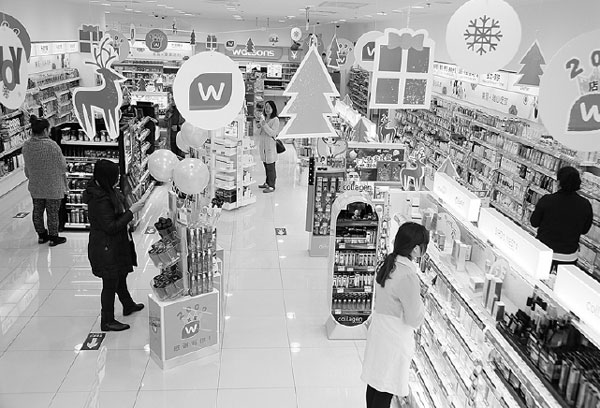Smaller cities key to Watsons' growth
Updated: 2014-12-11 15:45
By Wang Zhuoqiong(China Daily USA)
|
||||||||
The Watsons chain of health and beauty stores will continue to strengthen its presence using existing stores in first-and second-tier cities and expanding in lower-tier cities in the Chinese mainland, even as the retail market in the nation slows, a company executive said.
The chain operates under the A. S. Watson Group, Asia's largest health and beauty retailer.
Christian Nothhaft, chief operating officer of Watsons China, told China Daily that the company is expanding in the nation faster than its competitors.
|
With an accelerated pace of unveiling more than one store every two days, Watsons opened its 2,000th store in China, in Tianjin municipality, on Dec 2. About half of the brand's stores globally are in China. Provided to China Daily |
It has 100 percent coverage of the first-tier cities. In second-tier cities, the company still sees "a lot of store expansion possibilities", he said. Watsons aims to have 3,000 stores by early 2017.
"Emerging cities are so many in number and spending behavior is becoming more sophisticated and demanding. There are still opportunities for us selling innovative products," he said.
The retailer is present in more than 70 percent of third-tier cities. The figure is about one-third in fourth-tier cities, where there is huge growth potential.
"So our growth potential is horizontal, growing store numbers in both existing and new cities," said Nothhaft.
Watsons has more than 4,000 stores and more than 1,000 pharmacies in 12 Asian and European markets. Its parent A.S. Watson Group is a Hutchison Whampoa Ltd company.
About half of its brand's stores globally are in China. On Dec 2, Watsons opened its 2,000th store in China, in Tianjin municipality.
The company is not only finding new customers. It is also seeking to provide products that existing customers really want, he said.
"We did an adjustment according to customer needs," he said, citing the huge number of new products Watsons offers every year and emphasizing the significance of its own brand products.
Watsons-branded products, which have risen from very small shares of the total to more than 50 percent now, will keep growing, said Nothhaft.
To compete with retailers that have spent more on the Internet, Watsons China has expanded to social media, mobile apps and e-commerce. The retailer has its own website and online stores at major e-commerce websites including Tmall, JD.com and Amazon.cn.
This year, some of its stores in Shanghai began offering Wi-Fi service. The company aims to cover more cities in 2015 to directly engage with customers with product and coupon offers.
To support deliveries of orders from physical stores and online channels, Watsons set up nine distribution centers in China. About 60 million items on average are shipped every month from the centers. "It is important that you manage them yourself," he said.
According to Euromonitor International, the health and beauty specialist retail market in China is valued at 976.1 billion yuan ($159 billion) this year.
Jason Yu, general manager of Kantar Worldpanel China, said the firm's data show that average spending by customers on each visit to Watsons this year was up 8 percent to 94 yuan, thanks to its clear market position and in-store shopping experience.
He said that Watsons' biggest challenge amid the growth of e-commerce is how to get shoppers into its brick-and-mortar outlets more often.
wangzhuoqiong@chinadaily.com.cn
(China Daily USA 12/11/2014 page16)
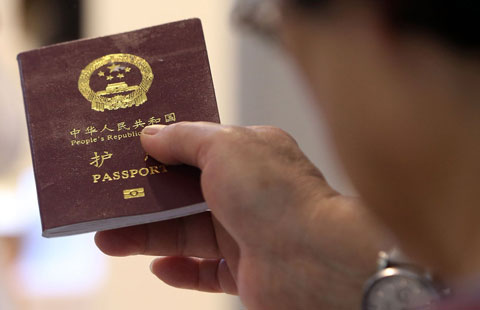
 Chinese passport opens more doors in 2014
Chinese passport opens more doors in 2014
 China faces: Glimpses of life and love
China faces: Glimpses of life and love
 Top 10 favorite gift brands of rich Chinese women
Top 10 favorite gift brands of rich Chinese women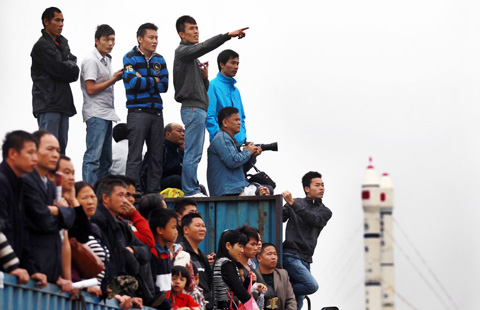
 In photos: Group watching
In photos: Group watching
 Pictures of the year: Fashion
Pictures of the year: Fashion
 Across Canada Dec 10
Across Canada Dec 10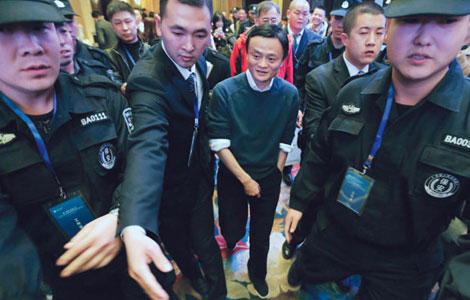
 Jack Ma in running for Time magazine Person of Year
Jack Ma in running for Time magazine Person of Year
 China: New climate change fund 'market-based'
China: New climate change fund 'market-based'
Most Viewed
Editor's Picks

|

|

|

|

|
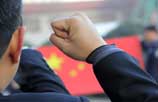
|
Today's Top News
Xi chosen as 'Person of the Year' in Russia
Hypersonic tests target no specific country
Vermont, California, NYC tap into EB-5 program for money
Massacre survivors, relatives urge Japan to reflect in letter to UN
Facebook may need a partner to get into China
BOC adds to China's portfolio of NY property
Watchdog goes online to fight graft
China Construction Bank Toronto Branch Grand Opening Ceremony
US Weekly

|

|
